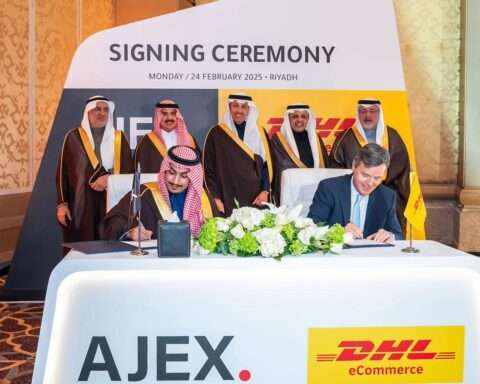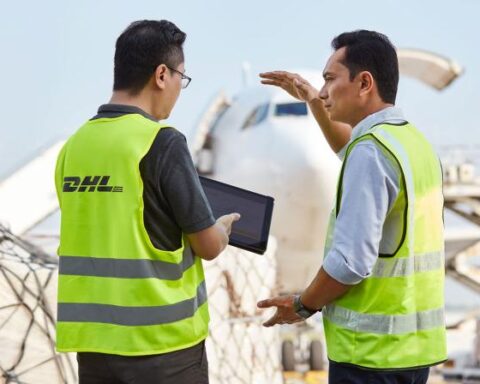Deutsche Post DHL Group continued its profitable growth course in the third quarter of 2021. Compared with the prior-year quarter, the Group increased revenue by 23.5 percent to EUR 20.0 billion, while operating profit (EBIT) rose by 28.6 percent to EUR 1.8 billion. In this interview with DPDHL Group News, CEO Frank Appel explains how Deutsche Post DHL Group was able to achieve sustainably higher profits and why the Group expects further record results.
Mr. Appel, how do you assess the Group’s performance in the third quarter?
Frank Appel: Deutsche Post DHL Group had an excellent third quarter. All divisions grew their revenues significantly. In the first nine months, we more than doubled key performance indicators such as EBIT, net income and free cash flow compared with the previous year. Already now we have exceeded the 2020 result – and the Christmas quarter, which is traditionally strong for us, is yet to come. The figures show that we have set exactly the right priorities with our “Strategy 2025”: full focus on our profitable core logistics businesses and consistent investment in digitalization and e-commerce. This enabled us to successfully convert the elevated demand for logistics solutions into profitable growth.
With the presentation of the results for the first nine months, you have again raised the outlook for the Group. What is your optimism based on?
Frank Appel: Vaccination rates are rising, global protective measures are being scaled back, and world trade is once again picking up. Shipment volumes in e-commerce remain on a new sustainably higher level, despite the retail sector having reopened. The recovery in the B2B business continues to pick up speed. Industrial production is as well significantly stronger compared to the pandemic peak. At the same time, we are optimizing our processes and becoming increasingly efficient. Accordingly, we expect record EBIT of more than EUR 7.7 billion and free cash flow of more than EUR 3.6 billion in financial year 2021. Based on the substantial higher level of earnings we have also raised our mid-term guidance.
Thanks to the very good business performance, the Group is earning significantly more money than it is spending. What will you do with the cash flow?
Frank Appel: Our top priority is investing into the future. We are investing heavily in the expansion and modernization of our infrastructure so that we are able to constantly offer our customers the best possible service. A few weeks ago we launched our new international hub at Paris Charles de Gaulle Airport. We also invested again in expanding the aircraft fleet at Express and in additional sorting capacity and enhanced automation technology. We have set ourselves the goal of investing EUR 2 billion in digitalization as part of our “Strategy 2025”. These investments help us to increase efficiency. At the same time they allow us to improve the customer experience and optimize the way how we collaborate. We aim to distribute 40 to 60 percent of our net income as dividend to our shareholders in accordance with our finance policy.
One of the cornerstones of “Strategy 2025” is sustainability. How is Deutsche Post DHL Group progressing along its decarbonization path?
Frank Appel: As the world’s largest logistics company, it is our responsibility to lead the way and guide the industry into a sustainable future. We have set ourselves ambitious targets for this purpose and are now implementing the planned measures successively. For example, we are shifting more and more parcels to rail transport: currently, the share is six percent; in the long term, we want to transport 20 percent by rail in Germany on a carbon-neutral basis. We are also making progress with regards to the challenging issue of decarbonizing air freight. We have already started using Sustainable Aviation Fuel (SAF) at our hubs in Amsterdam and San Francisco. We want to achieve a fuel blend rate of at least 30 percent by 2030. We are convinced that we will remain the first choice for customers, employees and investors if we continue to resolutely pursue our ESG goals. Thus we are investing EUR 7 billion in climate-neutral logistics solutions until 2030 to create the foundation for long-term business success.
Speaking of success: DHL Express once again had an exceptionally good quarter. Where does the division stand at the moment?
Frank Appel: We are feeling the upturn in the global economy especially at DHL Express. Volume growth in the previous year was strongly influenced by private consumption via e-commerce and the response to the pandemic – for the transport of medical protective equipment or to maintain supply chains. Now we are seeing continuously strong demand from almost all sectors of the economy and in almost all regions of the world. We were thus able to utilize our unique international Express network again on a very high level, achieving an outstanding EBIT margin of 16.4 percent in the third quarter. Based on the continuing high demand and corresponding price dynamics, we expect margins to remain attractive at Express in the future.
The cargo business also recorded high demand worldwide. How has Global Forwarding, Freight performed?
Frank Appel: Global Forwarding, Freight achieved an outstanding quarterly result. We increased revenue by more than 50 percent compared to the previous year and even more than doubled operating profit to EUR 372 million. The situation at some ports remains strained. Shipping containers are currently in short supply and prices are very high. In this environment, the shift from sea to air freight has become more frequent. The price difference has shrunk considerably, and air freight currently offers greater planning certainty. Thanks to the partnership with DHL Express, we were able to benefit in particular from access to their fleet of aircraft. Accordingly, air freight volumes are well above pre-pandemic levels. In ocean freight, we were able to increase volumes slightly despite the challenging environment and generated significant revenue growth thanks to higher ocean freight rates.
Managing supply chains is currently more challenging than ever. How has DHL Supply Chain been able to develop in this environment?
Frank Appel: The Supply Chain division performed extremely well in a challenging environment. Revenue and operating profit grew once again despite numerous challenges. The development of earnings clearly shows how Supply Chain has succeeded in leveraging its economies of scale worldwide through a standardized, scalable operating model enhancing efficiency. Our customers will certainly benefit from this as they are relying more than ever before on resilient and efficient supply chains. We have gained new customers and are increasing our penetration into the e-commerce segment within Supply Chain. With this, the establishment of special e-fulfillment locations continues to progress and receive a positive response. Early on we set the right priorities for our Supply Chain business and this is now paying off.
And what is the situation at DHL eCommerce Solutions?
Frank Appel: We are encouraged by the development of our international parcel business. The division was able to further increase revenue and operating profit in the third quarter compared to the previous year. We have grown in all regions. Especially in India we saw significant growth in shipment volumes, as business there was still heavily impacted by the pandemic in 2020. What we are particularly pleased about is that our youngest division is not only operating profitably just a few years after its launch, but is making a significant contribution to the Group’s earnings and continuing to deliver positive results.
That brings us to Post & Parcel Germany. How did the division perform in the third quarter?
Frank Appel: Post & Parcel Germany managed a challenging quarter well. In the course of the elections in Germany this year, we had a positive one-off effect in the mail business. However apart from that one-off effect, mail volumes continued to decline. At the same time, costs for materials and staff are rising. Digitalization and efficiency gains alone will not compensate for rising costs. We have therefore applied to the Federal Network Agency for an increase of prices, which has been approved recently and becomes effective starting next year. We are seeing the opposite trend in the parcel business: volumes remain elevated even after the reopening of brick-and-mortar retail. They even grew further in the third quarter compared with the high level of the previous year.
What does that mean for the Christmas quarter?
Frank Appel: In all divisions we are intensively preparing for possible record volumes at the end of the year. The Christmas quarter will be extremely challenging for all of us. It goes without saying that we want to offer our customers the highest quality, despite extraordinary shipment volumes. We already prepared ourselves in the third quarter and accordingly built up capacities to cope with this increased demand. In Germany we have further optimized the combined usage of the parcel and mail streams for processing lightweight parcel shipments in mail centers. We are also continuing to invest in new sorting facilities, larger and more efficient aircrafts and state-of-the-art IT solutions. Shippers and recipients can therefore be assured. We are well prepared for the peak season and will once again do everything possible to ensure that all shipments arrive on time for Christmas.






